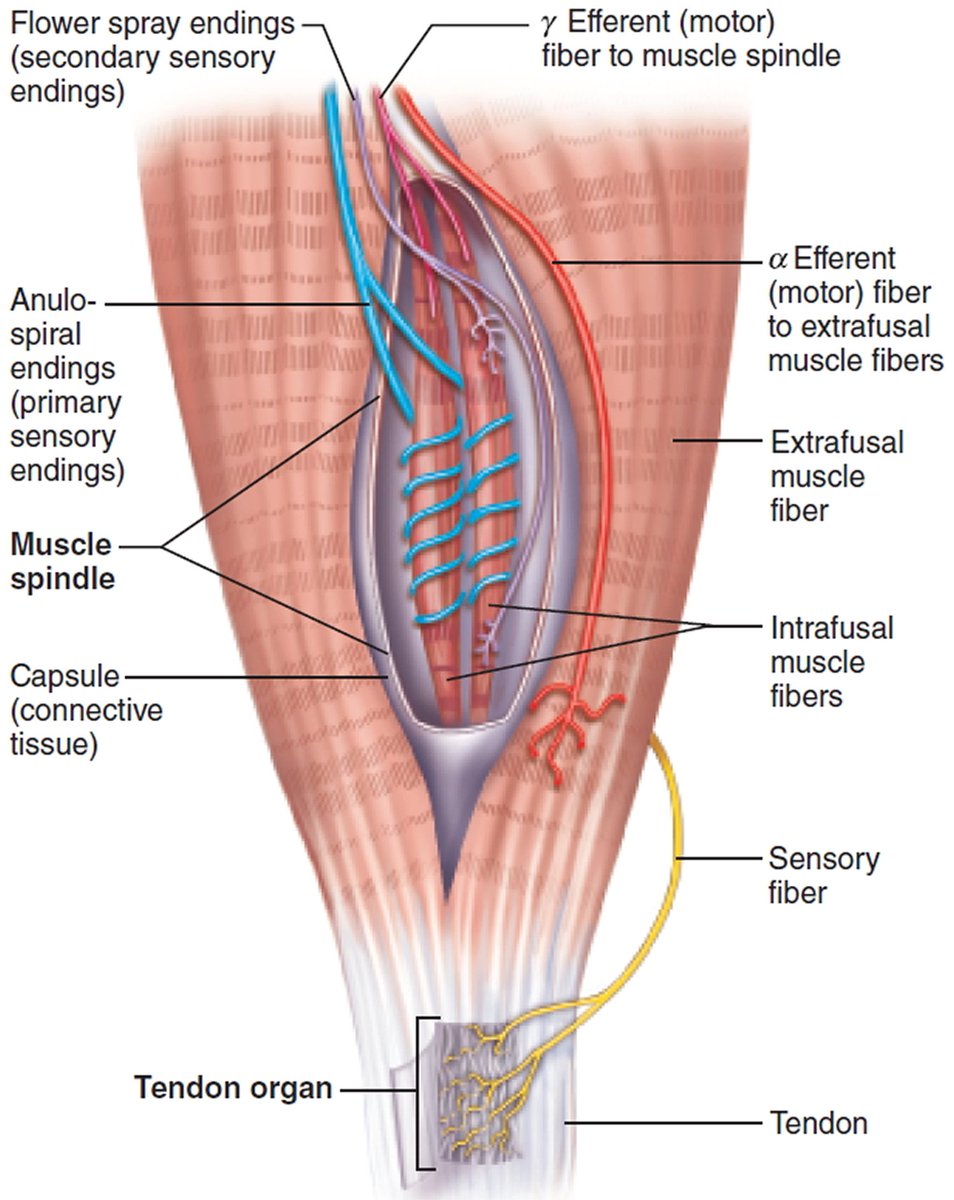Hello, friends and lovers of science! #NeuroThursday is gonna lurch back into action with the other side of how you stay balanced: your body's position-sense (proprioception) system. 

As a reminder, our last #NeuroThursday discussed the vestibular system: the tools your brain uses to maintain your balance. But that stuff is all in your head, so today we go to the rest of your body.
External Tweet loading...
If nothing shows, it may have been deleted
by @BenCKinney view original on Twitter
Proprioception is the original "sixth sense." It's a major sensory apparatus spread across your body, telling you critical information, but it's all so smoothly integrated you almost never have to think about it consciously.
Without proprioception, movement is basically impossible. As soon as you stop paying close attention to your limbs, they start wandering off. Flopping over, smacking into people, causing other random shenanigans.
A great demonstration of this is Ian Waterman, who in 1971 contracted an illness (probably meningitis) that destroyed his proprioceptive nerves.
There's a wonderful BBC documentary about this guy. Go watch it later. But let me hit a few high points so you don't have to take a 50-minute break from this thread.
Ian was totally nonfunctional. He was told he'd spend the rest of his life in a wheelchair, unable to dress, care for himself, or live independently. But over the course of years, with therapy, he found a workaround...
Ian learned how to move again by watching his limbs. He walks now with a crook-necked stance so he can see his feet and legs. He has to keep a close eye on everything he's doing – but with effort, he can life a typical life.
But most patients aren't so lucky. Ian's tried to teach his skills to other people with similar deficits, with limited success. Ian is either very lucky, very persistent, or maybe it's just that he was fairly young when it happened.
So what was it that Ian lost? What was his body doing that is so critical for controlling movement, especially when he can't see his limbs?
Proprioception comes from three different places: tendons, muscles, and skin. (Or, really, three types of places. You got a lot of skin there, friend. You should put a few of them back where you found them.)
In your tendons (connective tissue that anchor muscle to bone), you have little things called Golgi Tendon Organs. They detect when the tendon is stretched - which happens every time your muscles flex around a joint.
(Pro tip: now you, like me, are cursed to think of these every time someone uses the abbreviation GTO.) 

(Double-pro tip: the GTO was discovered by the same Camillo Golgi who flipped out at the guy who discovered neurons back in #NeuroThursday #3)
External Tweet loading...
If nothing shows, it may have been deleted
by @BenCKinney view original on Twitter
In muscles, your proprioceptive system has "spindles" instead. Why a different tool? Muscles offer some funky mechanical challenges, because they change length. (Bend that elbow and your bicep goes short & thick!)
Think of the muscle spindle like a spring. Usually, if you push/pull on the ends, it'll change. But squeeze it too tight, and you stop being able to squeeze it anymore. Loosen it too much and it goes floppy.
To fix this, you have a whole separate set of muscles! Each spindle has a separate muscle inside it that counteracts the big muscle just enough to keep the spring properly tense.
Check it out: I heard you liked muscles, so I put a muscle in your muscle! 

If you want Fancy Science Terms, then your regular body-moving muscles are called "extrafusal muscle fibers," paired with little spindle-tensing muscles called "intrafusal fibers." (Apparently a spindle is "fusiform." Who knew?)
Lastly, you got your skin stretch receptors. AKA such awesome names as Bulbous Corpuscle or Ruffini Ending. These friends are great at detecting fine movement and pressure. You have lots of them on your fingertips so you can tell when something starts to slip from your grasp.
I'm pretty sure Ian Waterman was missing the inputs from both his GTOs and his muscle spindles. It's not that he has trouble with his grip - he just can't tell where his limbs are, if he's not looking at them.
Where are your arms? Seems like the kind of thing you wouldn't forget. Yet most of us are used to living in bodies with well-functioning proprioceptive systems that let your brain constantly check and update.
But here I am talking about arms, when I promised you today would be about balance. Don't worry, in this case they're the same thing. I'm can talk more about arms (that's my expertise), but the same capability keeps you walking.
If you'd like to test what life is like with poor proprioception… Welllll, there's a reason field sobriety tests include "walk a straight line." Moderate/severe alcohol intoxication impairs this system.
Even with mild impairment to your body position sense, you get real clumsy – and real stumbly – real fast. Nothing is wrong with your movement control, but there might as well be, if you can't maintain a good idea of where your body is.
#NeuroThursday takeaway: Body position sense (proprioception) is a distributed, multi-part deal. Skin, muscles, tendons. This sense is intrinsic to every muscle you have, yet – as is so often true – your brain does the work unnoticed.
Thanks everyone! If this helped you find your balance, please share it around, suggest a new topic, and/or enjoy some of my fiction! benjaminckinney.com/publications/
unroll
P.S. Bulbous Corpuscle vs. Ruffini Ending is the headline fight for my new Wrestlemania event.
I'm just sayin': Ruffini will END YOU
I'm just sayin': Ruffini will END YOU
• • •
Missing some Tweet in this thread? You can try to
force a refresh




